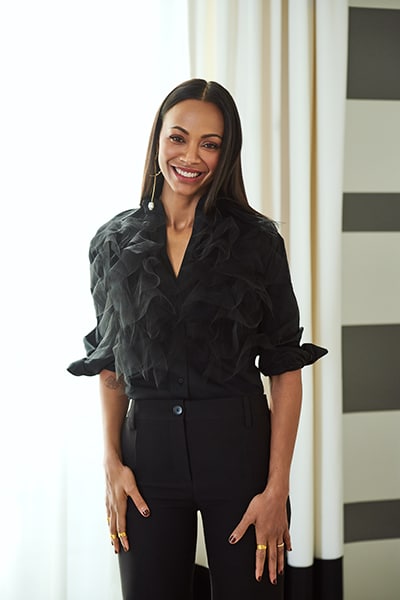|
Getting your Trinity Audio player ready...
|
After I spoke to Zoe Saldaña for the better part of an hour, it took me a few days to get my head around everything we talked about and to put into context what it all meant.
Besides, first I had to put out the flames.
I had spent more than an hour studying Saldaña prior to our conversation, and it felt like my brain was on fire.
There are a few things you must know about the 40-year-old actress, producer, artist, activist, and entrepreneur.
First: Yes, all those titles apply. Like other driven hyper-achievers, Saldaña has so much on her plate that she would need to be cloned to accomplish everything she wants to get done during her time on Earth.
Luckily, as Saldaña’s fans know from some of her biggest movie roles—such as intergalactic blockbusters like Star Trek, Avengers, and Guardians of the Galaxy—it’s not always clear that she is confined to just one planet.
Nor is she confined by the opinions of others about who she is and what role she is supposed to play.
The fact that some people might see her as primarily an actress didn’t stop her from launching her own production company, Cinestar, with her sisters, Cisely and Mariel.
The fact that Saldaña is not African-American, but technically Afro-Latina (with a father who was Dominican and a mother who is Puerto Rican) didn’t stop her from undertaking the bold move of playing African-American musician and civil rights activist Nina Simone. Though her performance in Nina won praise for its intensity, African-Americans were critical of what they considered a case of cultural appropriation.
The fact that she is proud of her heritage and often identified as a Latina actress—and part of a cohort of Latinas in Hollywood that includes Eva Longoria, Gina Rodriguez, America Ferrera, and Rosario Dawson—doesn’t stop her from thinking of herself as primarily an American.
The fact that she hopes her three young children—all boys, under the age of five—will someday remember her as an artist doesn’t interfere with her desire to be an activist for causes she believes in as a woman, Latina, and mother.
Finally, the fact that Saldaña has spent more than twenty years in the world of films and entertainment didn’t deter her from bravely taking a stab at the world of media—specifically digital media and electronic news—through her newly launched media brand, BESE (pronounced “bee-say”).
I asked her how she became interested in media—which is, at its core, about disseminating information.
“I understand the power that media has to connect with people in a very quick way, and also through storytelling and representation,” she told me. “Representation cultivates aspiration. I’ve seen it all around me. And I’ve also been a witness to what happens when that representation is not there, how much it affects someone’s identity.”
The name of the digital-media platform derives from the verb “to be” in both English (“be”) and Spanish (“se”). The message is: Know yourself and be yourself.
That also happens to be Saldaña’s life philosophy in a nutshell.
The site’s mission is to shape what Saldaña calls “the dominant cultural narrative,” centered around 58 million Latinos and how they went from trying to fit into the mainstream to defining the mainstream. The plan is to tell stories that might normally go untold and provide uplifting portrayals of interesting people, all with a multicultural spice that reflects the America of the twenty-first century while giving opportunities to Latinx writers and content providers.
Investors include Sol Trujillo, global telecom executive and former CEO of US West; Ralph de la Vega, former AT&T vice chairman; Monica Lozano, former CEO of ImpreMedia and La Opinión newspaper in Los Angeles; White Owl Capital Partners; M Ventures; Howard Morgan, cofounder of First Round Capital; Michael Francis, former CMO of Target and DreamWorks Animation; Erik Oberholtzer, cofounder and CEO of Tender Greens; and other prominent individuals.
“Representation cultivates aspiration. I’ve seen it all around me. And I’ve also been a witness to what happens when that representation is not there, how much it affects someone’s identity.”
Zoe Saldana
At the heart of BESE, you’ll find Saldaña’s partner, media and entertainment veteran Daniel Batista, who acts as president and COO. There is also an in-house staff of about a half dozen people who, in turn, rely on several freelancers to produce content. But, everyone agrees, it is Saldaña—as editor-in-chief—who gets the final word.
Although the people who run the day-to-day operation of BESE would likely insist that the goal of the venture is to attract as wide and diverse an audience as possible, it’s clear that a huge chunk of that audience is so-called Generation Z.
The “Z” doesn’t stand for Zoe, but it might as well. Because these two entities “get” each other. Even though Saldaña is part of the preceding generation, the millennials.
You know the Z. They’ve been called iGen, because—born after 1995—they’ve spent much of their lives, and in some cases their entire lives, in the age of the smartphone.
Let that sink in. Baby boomers always had radio. Generation X grew up with television. Millennials have never known a world without the Internet. And Generation Z doesn’t know what life was like before Steve Jobs put the world into the palm of our hand.
The Z prefers Instagram to Facebook, texting to email, and a few minutes alone to hours spent socializing with friends. They’re incredibly media-savvy, yet also skeptical of most existing media and all its agendas. They’re not big on borders, boundaries, or boxes. They like nuance, fluidity, and flexibility. They’re about defining themselves on their own terms—and the transgender revolution that we’re living through at the moment is just the most obvious example.
One more thing: The Z is starving—for news and information about issues they care about with something that traditional media sources often fail to deliver: context. They’ve been screaming out for several years now: “Don’t try to tell me what to think. Just tell me what happened, and what it all means to me and the people I care about.”
Not only did Saldaña hear that scream. She was one of those doing the screaming.
“I was taking myself as a case study,” she said. “Because I was noticing the disappointment that I had felt for so many years, of not seeing myself reflected in everything around me. As I consumed information on entertainment, news, art, technology, or whatever, I didn’t see myself.”
Then came a bolt of inspiration.
“So, I was like, ‘Well, if I’m experiencing this, and I’m an American of Latin origin, I wonder if other communities within my community—especially young people—are feeling the same way,” she said.
The vacuum was there, in part because traditional media companies have been so dense about expanding their audience.
“I do believe that there is a very big imbalance in our nation where all the information given to us—usually through media conglomerates that are privately owned—isn’t as free and as neutral as it should be,” she said. “Therefore, our communities are not informed properly and the conversation feels very uneven and very incomplete.”
Saldaña doesn’t like being described as ethnic. In fact, she rejects the whole concept of ethnicity—along with words such as “minority” or “exotic” or “diverse.” She’s not any of those things, she said, because they’re all tied to how someone else sees you or how you relate to another person.
Exotic compared to what? A minority standing next to what majority? Diverse as opposed to what?

She’s just Zoe—American, New Yorker, Mets fan, daughter, sister, wife, mother, actress, producer, artist, activist, businesswoman. You can come to her if you like, on her terms. Just don’t expect her to come to you on yours.
“In order to teach our fellow American brothers and sisters to respect us and see us as Americans, we have to title ourselves as Americans first,” she said. “After all, you can’t blame somebody for othering you when you’re the one who initiates that. I’m proud of my heritage. I live it every day. I don’t need to title it.”
The word “American” came up a lot in our conversation. Saldaña’s patriotism comes through loud and clear, and it’s refreshing to hear from a celebrity.
“I am American first, before I am anything else,” she insisted. “It is how I walk through every door. I don’t walk into a place thinking that I’m Latina or that I am Black. I walk in knowing that I am American first. Everything else comes from that. And when I pledge allegiance, I’m pledging allegiance to my American flag. I’m going to raise my sons to fight for this nation if we ever have to.”
Don’t misunderstand. She’s not being stubborn or arrogant. Quite the opposite. She’s surprisingly down to earth, even humble about the world and her place in it.
Saldaña displays that humility every time she walks into the offices of BESE and surrounds herself with people who know more about digital media and business than she does. She doesn’t fake it or lord over them; instead, she listens and asks questions—lots of questions. In the process, she gets smarter, the product improves, and the company benefits.
Like most things, it seems, Saldaña has thought this out.
“BESE needs to start in a very mild way so we gain trust,” she said. “We come in peace. We’re not here to be sensational. But, as we continue to grow, our research will become much more extensive. Therefore, the stories that we are beginning to tell are not just people who are trailblazers in their own communities, but also Americans with great stories that have impacted the very fabric of our nation on a larger scale.”
Saldaña has such a story. I asked if, looking back, she could pinpoint the exact source of her confidence and strength. She could. Her mother.
“My mother told us that we were just as great and just as special as anyone else,” she said. “She never encouraged me to victimize myself. I was never taught to be angry or to think: ‘these are the oppressors’ and ‘we are the oppressed.’ And this is a very healthy way of looking at life.”
Finally, taking a point of privilege, I asked Saldaña a personal question—personal to me. I wanted to know what advice she would give me about raising my two daughters—Latinas, ages nine and fourteen—in the era of #MeToo and wage inequality. How could I level with them about what they’re likely encounter in what is still a man’s world without crushing their spirit and making them victims?
“I don’t think you should spend that much time on the obstacles,” she told me. “I think that, while you have them under your care and your guardianship, your job is to create a vast universe for them in their mind, in their heart, and in their spirit. Because the world is already limiting. As soon as they leave your door, the world is real. So why should your home be filled with all of that reality?”
Now, on a roll, she kept going.
“Because, one day, they’re going to come to you with a broken heart when somebody tells them something ignorant and somebody ‘others’ them. They’re going to come to you always. And when that happens, they have to make that choice within themselves: Do I choose to believe what Papa tells me or do I choose to believe what that other person told me? And if Papa has been telling me my whole life that I am just as great and I am just as strong and just as capable, when I discover for myself that the world doesn’t feel the same way, I’m going to believe Papa.”
She crushed that answer, didn’t she? Damn. Here comes that fire again.
On Informed Voters
“It’s our American duty to vote. It’s our American duty to inform ourselves properly about all the policies that don’t favor minority groups. So when that information isn’t out there . . . I feel like right now—this is no exaggeration—sensationalism and negative portrayal of information takes a very emotional approach. It’s not pragmatic, it’s not informative.
So that we as an American public can make a good decision for ourselves, then those that have the ability to shed light on that information have a civil duty. It’s about shedding light on topics and on people that are either working for the majority of Americans or working against. And it’s about whether or not our American community—and specifically our Latin-American community—knows about this news, this information. When they have no idea of what’s really going on and how everything affects them, then obviously you can’t blame them for not voting or for voting for people that don’t really represent them and their best interests.” —Zoe Saldaña
Style Credits
Shoot location: La Peer Hotel Kimpton
Attire (banner image and video): Roland Mouret dress, Cadar earrings, Misho + Alexandra Jules rings
Attire (inset image): Valentino suit, MISHO jewelry

